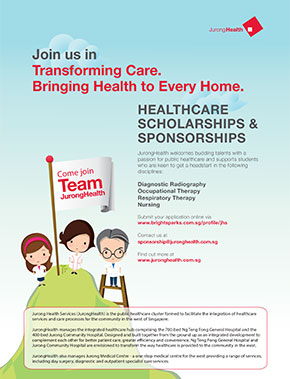Illness and disability affect more than just the physical capabilities of an individual. They can also be detrimental to one's psychological and social well-being. At times, patients with more complex backgrounds require more than just medication before leaving the hospital – they require additional psychological support and assistance in order to cope with their medical conditions and related psychosocial problems.
This is when the intervention of medical social workers comes into play. Medical social workers support patients through financial assistance, counselling and coordination of post-hospital care plans. Their work ensures that patients of all medical and social backgrounds can benefit from a holistic care system.
Medical Social Worker (MSW) Tiffany Tan takes time off her busy schedule to talk to us about her profession. The affable individual also tells us what she thinks are important qualities for those who wish to follow in her footsteps!
What got you interested in the healthcare sector, and in particular medical social work?
Tiffany Tan: The patients you meet in a hospital setting all need help to some extent – whether they are visiting the specialist outpatient clinic or entering the Intensive Care Unit (ICU). It is fulfilling as I'm able to support and journey with patients and their families.
Medical Social Work appealed to me because it allows me to interact with such patients and make a difference in their hospital experience, especially since the hospital setting might be difficult to navigate for most people. The variety and fast-paced work adds excitement, which means I'm never bored! These are also aligned with my interests and personality.
Tell us more about your role.
Tiffany: A large part of our work is providing psychosocial support to the patients and families we meet. Through our psychosocial intervention of patients, we understand the assistance needed to reintegrate them back home and into the community. Assistance could be providing financial assistance, linking up with services and/or counselling so that eventually they can remain self-sufficient.
Our cases are indeed varied – we may be referred patients at risk of suicide, who experienced domestic violence, have alcohol addiction, lack family support or are even homeless. As MSW, we look beyond the biology of a patient and provide a psychosocial perspective to the team of healthcare professionals.
What are some challenges you face?
Tiffany: One challenge is in managing expectations of patients and family members. It takes lots of creativity to mitigate these expectations carefully as relationships could be fragile. We hope to build and not add stress to these relationships or abandoning patients at the hospital would be an option for some.
Another challenge MSWs face is balancing a tailored care plan for each patient with available resources, such as making appropriate referrals to community services. Patients with complex needs or in the gap might need more advocacy on their behalf to ensure that their needs are met. We need to do this in order to ensure that everyone returning home would be sufficiently supported to face the challenges in their own home.

Tiffany Tan Yi Ting
Healthcare Scholar
Medical Social Worker
Share some memorable episodes you have had as a MSW
Tiffany: A memorable case was my first patient back when I was on my clinical attachment in Australia. He was transiting from hospital to a nursing home. I recalled explaining processes over and over to be sure he understood. When I came by to visit him on the day he was transferring to the nursing home, he very simply said, “You made my day by coming to visit.” The case helped me to cement my interest in this profession, knowing that there are differences I can make. There have been many interesting moments which allowed me to walk away feeling appreciated, but also feeling that I can have a part to help those in need.
What qualities must all MSW possess?
Tiffany: MSW have to love interacting with people and want to make a difference in their lives. That is pretty much what we do. Patience and compassion for patients as well as their families are also important, since nothing is truly simple when dealing with people and relationships. Empathy, by putting yourself in others' shoes, is also key in connecting with patients and their loves ones.
I personally feel that there is no gold standard for social workers. You do not necessarily have to have the best communication skills or start out as the most effective organiser. These skills can definitely be honed on the job with supervision. At the end of the day, it is important to have the heart for the work and willingness to work hard for the patients you serve.
What else do you look forward to in your career?
Tiffany: At this moment I am still trying to hone my social work skills and become better at what I'm doing, assisting patients to reintegrate back to their daily lives well! As I believe the social work perspective is so useful in understanding people in their environments, I hope to apply my skills and perspective at the macro level to contribute to society by influencing change on a wider scale such as in policy work, to benefit my patients and beyond.

